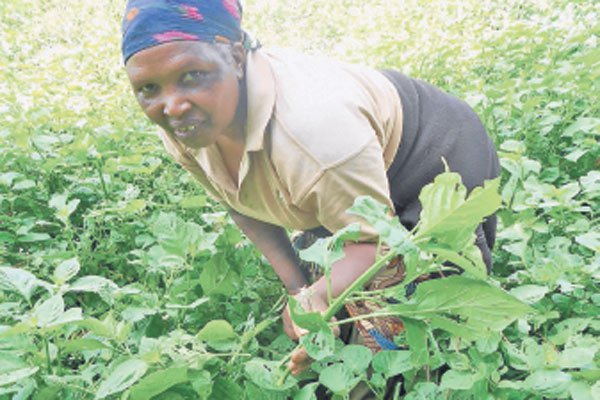The big and fleshy heart-shaped leaves give no indication of their real value, until you notice how tenderly Ms Wahu wa Njoroge handles them.
She moves around her farm, at Bathi in Kijabe, Kiambu County, plucking the leaves of the traditional vegetable, named black nightshade (solanum nigrum), also know as managu.
It once grew wildly on the fertile deep soils and families relied on this highly nutritious vegetable that required little care yet it guaranteed even the poorest quality nutrition.
The vegetable is increasingly becoming a rare commodity, with few farmers growing it.
Five years ago, most of Wahu’s customers were only her immediate neighbours, but today people travel from afar to buy the vegetable.
Prices have shot up, earning Wahu a tidy sum from her quarter-acre piece of land.
The local agricultural office recognises her as a commercial nightshade grower, according to the Kimende agricultural extension officer, Alex Njenga.
Every season, Wahu sets aside a section of her eight acres for the indigenous vegetable. After ploughing, she spreads organic manure and leaves the soil to cure for some time before planting.
All she has to do thereafter is to regularly uproot weeds. After slightly over a month, she begins harvesting.
She normally plucks off the six top leaves of every shoot. Subsequent leaves grow bigger and greener.
Soon, the plant grows to five feet, heavily laden with its big, fleshy, dark green leaves.
A bunch of the vegetables goes for Sh20 and she harvests over 400 bunches per month for as long as the weather remains conducive.
She earns about 100,000 per season from the plant. A good year has up to three seasons.
Once the dry season sets in, the leaves harden and lose colour. “This is the time to uproot the vegetable,” says Njenga.
Wahu often buys certified seeds to boost the quality of the crop.
Emily Kathambi, a nutritionist at Agape Nutrition Consult, says nightshade leaves are highly recommended for several ailments due to their anti–oxidant and anti-rheumatic properties. Nightshade is also useful in treating diarrhoea, eye infection, scurvy, mouth ulcers. It is rich in iron, calcium and vitamins.
Save for spider mite attacks, the vegetable is not known to face major challenges.
Nightshade is listed by the ministry of Agriculture as a one a high-yielding vegetable.
Large scale farmers are now making an entry into nightshade growing, and some are drying it for export.










